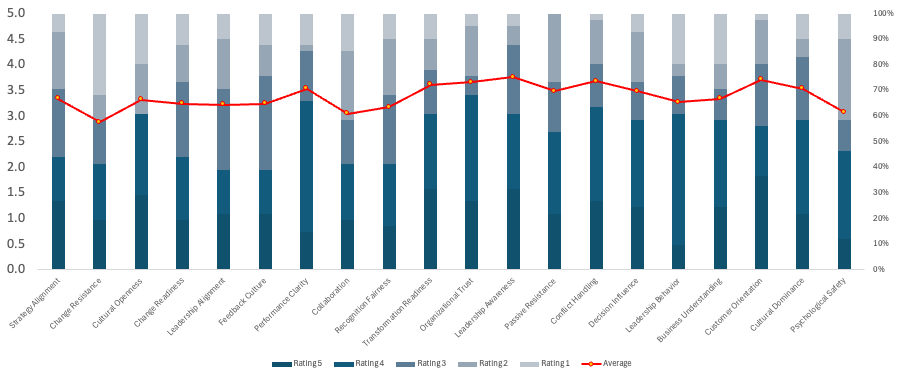Is Your Business Ready for a Management Consultant?
- Sukanya Chatterjee
- Apr 30, 2024
- 7 min read
Updated: Jul 2, 2024

Internal and Capability | Objective & Expectation | Expertise and Experience | Contract and Terms | Cost and ROI
Welcome, dear readers, to a tale as old as time (or at least as old as corporate history): The Engagement of a Management Consultant! This is no ordinary corporate affair. Prepare yourselves for a rollercoaster ride of hilarity, mishaps, and the occasional stroke of brilliance as you embark on the quest to improve performance by engaging a Management Consultant.
Before diving into the wild world of management consultants, strap on your seatbelt and prepare for a comedic adventure through the labyrinth of corporate chaos!
Picture this: you are watching an endless parade of consultant options, each one more dazzling than the last. But hold your horses! Before you are swept away by the allure of flashy PowerPoint presentations and promises of world domination, remember the golden rule: clarity is king!
Ensure you're not accidentally signing up for a circus act instead of a consulting gig. Once you have dodged that bullet, it's time to master the ancient art of negotiation. Picture yourself haggling like a pro in a bustling bazaar, except instead of spices, you're bargaining for budget-friendly consulting fees. And let's remember the importance of cultural compatibility! Finally, set those expectations straighter than a drill sergeant's posture. After all, you don't want your consultant thinking they're here to perform magic tricks when you were expecting a strategic overhaul!
Summarise Video
Internal and Capability

Is your team ready to embark on the transformation?
Assessing your team's readiness for transformation is like orchestrating a symphony of chaos, complete with dancing squirrels, flying acorns, and the occasional UFO sighting.
Key aspects to consider are the Current Workload, Ongoing Projects, Future Projects, etc.
Is your team capable of comprehending transformation?
Irrespective of the capability of a Management Consultant, it's your people who drive the success story. Your people's ability, change adaptability, and leadership define the outcome of the engagement. It's the fundamental reason why even the same consultant cannot consistently replicate the same results.
Key aspects to consider are knowledge, learning ability, culture, engagement level, acceptance level, etc.
Will it be a one-time activity or a continuous journey?
Based on this aspect, you need to prepare your team. A one-time activity is easy and driven mainly by a Management Consultant, but defining a team and preparing people is a much more challenging job for projects with a continuous impact. You may even need to focus on succession planning to ensure the sustainability of the benefit.
While one-time activities may be like ordering a pizza—easy, delicious, and over quickly—continuous projects are more like committing to a lifetime supply of spouted salad — healthy, but you'll probably start craving a pizza after a week!
What is the Root Cause of engaging a Management Consultant?
Before engaging a management consultant, it's crucial to clarify why you need their expertise and whether their deliverables will truly address your organization's challenges. Take the time to understand your specific problems and assess whether a management consultant's skills and experience align with your needs. After all, you would only hire a plumber to fix your computer if you're really desperate for tech support!
You need to be clear about why you need a Management Consultant to do the job? Will the deliverable of a Management Consultant will solve your problem?
By comprehending these details upfront, you'll avoid the frustration of mismatched expectations and ensure that the consultant's deliverables are tailored to your organization's unique needs. So, before you sign on the dotted line, ask yourself: "Will the deliverables truly solve my problem, or am I just buying a ticket to the disappointment train?"
Objective & Expectation

What is your end objective?
Navigating a transformation project towards success is like exploring uncharted waters with a clear destination in mind. By setting clear goals, identifying current challenges, and defining desired outcomes, organizations can lay the foundation for a successful journey.
Engaging stakeholders at all levels ensures comprehensive and aligned objectives with the organization's strategic vision. With well-defined objectives, organizations can confidently and purposefully navigate the complexities of transformation, paving the way for growth and progress.
What are intangible benefits you are expecting?
In addition to tangible benefits, a transformation project can yield several intangible advantages. Though not immediately quantifiable, these intangible benefits can have a profound and lasting impact on the organization's success and adaptability in the long run.
Some of the prominent intangible benefits are Enhanced Organizational Culture, Improved Leadership Alignment, Increased Adaptability and Resilience, Enhanced Customer Perception, Stakeholder Confidence, Learning and Development Opportunities, etc.
What is your team's expectation?
You need to remember that your and your team's expectations will differ. If you have one expectation, mark my words; your team will have at least 7 to 8 different expectations cumulatively. Within any team, there's a diverse range of expectations, each reflecting individual perspectives, roles, and priorities.
You can harness the collective energy and enthusiasm towards a shared vision of transformation success by fostering open communication, soliciting feedback, and ensuring alignment with each team member's objectives.
Expertise and Experience

What is the expertise of the Management Consultant?
Consulting is a very vast subject. If you're looking for a management consultant, it's crucial to pinpoint those with the exact same skill sets. Why settle for less when you can have the best?
When selecting a management consultant, it's like finding the perfect Tomato in the vegetable market— you want one that's just right! Consulting is like a buffet of expertise, with options ranging from strategic wizards to change management gurus to tech-savvy maestros. Settling for anything less than the "crème de la crème" is like choosing the mushy Tomato that's seen better days— nobody wants that!
So, let's be picky! Why settle for a merely good consultant? Let's aim for the top shelf because when it comes to transforming your organization, you deserve nothing but the best!
What are the experience/success stories of the Management Consultant?
To ensure you're partnering with top-tier consultants for your project, it's crucial to thoroughly vet their background.
Start by reviewing their credentials, certifications, and professional affiliations to ensure they have the qualifications.
Assess their experience by examining case studies, client testimonials, and references to gauge their track record of success.
Verify their reputation by researching reviews and feedback from past clients. You must know someone with whom he or she has already worked.
Evaluate their expertise in the specific areas relevant to your project, considering factors like industry knowledge and functional expertise.
Conduct interviews to assess their fit with your organization's culture and communication skills.
Request detailed proposals and references to gain further insights into their approach and effectiveness.
For Consulting firms, it's important to verify crewed consultants' credentials as well.
Following these steps, you can confidently select well-equipped consultants to meet your project needs and deliver exceptional results.
Contract and Terms

Defining Milestone/stage gates
In consulting projects, realizing benefits often takes time, so defining milestones at frequent intervals is essential to monitor progress. These milestones track the consultant's contributions and assess the organization's support and performance. By establishing checkpoints at regular intervals, organizations can measure incremental progress, identify potential roadblocks early on, and make necessary adjustments to stay on track. Additionally, these milestones serve as a means to engage stakeholders, maintain momentum, and ensure alignment with project objectives throughout the project.
So, let's buckle up and zoom towards those milestones like a hungry cheetah—because in the world of consulting, every step forward is worth celebrating, even if it's just a tiny shuffle in the right direction!
In essence, frequent milestones provide a roadmap for success, guiding consultants and organizations toward achieving desired outcomes.
SLA of each stage gates
In the realm of consulting progress, it can feel as elusive as finding a whale in a petting zoo. Defining Service Level Agreements (SLAs) for each milestone is like having a GPS guiding us through the enchanted forest of project management. These SLAs aren't just boring contracts; they're magical spells that ensure everyone knows their role, responsibilities, and the deadline for delivering results.
Picture it: each milestone is a quest, and our SLAs are the treasure maps that lead us to victory. By setting clear expectations and timelines for each milestone, we're not just waving our wands and hoping for the best—we're casting spells of accountability and transparency, ensuring everyone is on the same magical journey towards project success.
So, let's dust off our wizard hats, polish our crystal balls, and conjure up some SLAs that would make Merlin himself proud—because in the fantastical world of consulting, even the most mundane tasks can become legendary feats of wizardry!
Validation process of stage gates
Crafting strong Service Level Agreements (SLAs) is like casting powerful spells in the world of magic. You can meticulously define the SLAs, ensuring they are SMART and aligned with project objectives. Your council of experts will review these agreements, ensuring they resonate with the project's energies. You can also value customer feedback and use it to improve our SLAs. Lastly, your oversight ensures SLA adherence and empowers your team with the knowledge to succeed. Through this enchanting process, your SLAs become potent tools, guiding you on a mystical journey towards project success.
Payment terms
Crafting payment terms is like baking a magical cake—you want just the right ingredients to keep everyone happy and focused on the frosting, not the flour!
Clearly defined payment terms ensure that all parties involved focus their energies on the project work rather than squabbling over payment details. These terms should be tailored to the specific nature of the project and deliverables, ensuring fairness and transparency for everyone involved. By establishing payment terms upfront, we create a harmonious environment where the focus remains on achieving project goals and delivering exceptional results.
Cost and ROI

Total cost of engagement
It's not only the consultancy fee. There are many other direct and indirect cost associated with consulting projects. Some prominent expenses are Manhour invested by your people, Capex & Opex, Admin, Transportation, etc. By accounting for these expenses alongside consultancy fees, we create a comprehensive budget covering all aspects of the consulting project.
This ensures that every magical moment and mystical endeavour is accounted for in your budgeting potion.
ROI, both in terms of tangible & intangible
In the fast-paced world of business transformation, measuring success goes beyond the traditional bottom line. While tangible ROI metrics like increased revenue and cost savings are the shiny trophies everyone strives for, there's a hidden treasure trove of value lurking just beneath the surface—the intangible ROI.
Like uncovering hidden gems in a mystical cave, capturing these intangible benefits requires a keen eye and a sense of adventure.
_edited_edited_edite.png)













Comments